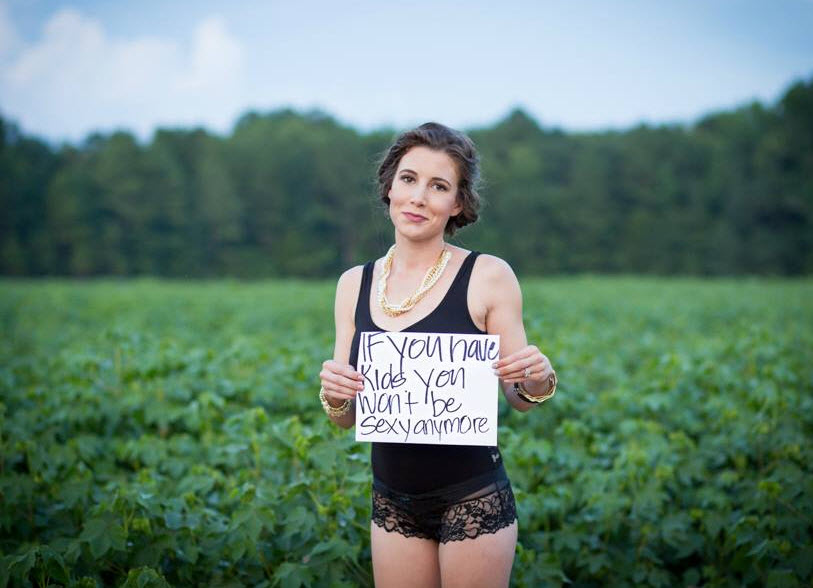With her brilliant red and orange spectacles and a necklace of multi-coloured pompoms, Taryn Brumfitt stands out in a crowd. She is vivacious, laughs often and isn’t afraid to upload videos of her zany dance moves – in short pyjamas, jiggling her thighs – on social media, trying to impress talk show host Ellen DeGeneres.
This is, after all, the Australian woman who boldly posted before-and-after photos of her changing body on Facebook in 2013: the before – taut and toned, the perfect bikini body; the after – tastefully naked with curves, stretch marks, and no spray tan.
From obsessed and unhappy, to healthy and happy.
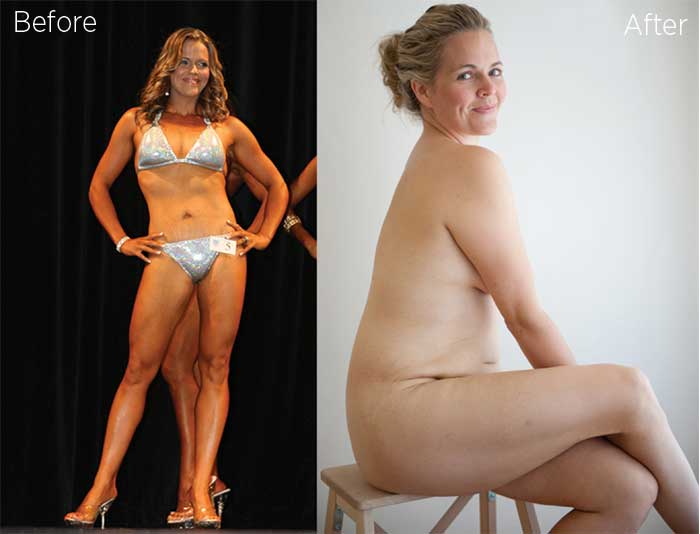
The photos that caught the world’s attention.
Those pictures went viral, made headlines around the world and, says Taryn, “broke people’s brains, to think a woman could love her body afterwards.”
There are moments when perhaps the vibrant mum-of-three would prefer to be incognito. Like when she is trying to buy groceries at her local supermarket and she is stopped by women who want to tell her how she has influenced them.
“Yesterday, it was a woman with a baby in her trolley. I was walking past in my own world and she suddenly said, ‘You changed my life!’ I was like, ‘Oh, thank you,’ and gave her a hug,” Taryn says.
“It’s always very sweet. To think of the turmoil and heartache these women are going through behind closed doors, and that they can come out of that space and tell me about it.”
She knows it’s important for her to put down that bottle of milk and listen. Because it wasn’t long ago that Taryn was one of those women. A young mother who detested her own body so much, she found excuses not to leave the house. A professional photographer who was about to undergo plastic surgery to change the way she looked, until looking at her own young daughter convinced her otherwise.
Now, Taryn Brumfitt, aged 40, is taking on the world for the rest of those women. She’s made it her “life’s work” to become a global voice for change – to alter the way society sees the perfect body, to change the attitudes of body shamers, and to teach women the value and power of loving their bodies, no matter how they look.
She’s not doing it solo. At her side – literally five metres away sitting in a swivel chair in their suburban Adelaide office – is Mathew, her husband of 14 years. He gave up a successful career in global logistics to become the managing director of the Body Image Movement (BIM) – a “crusade to end the global body-hating epidemic”.
The BIM activism group is fighting this universal cause through social media, petitions and, most effectively, through Taryn’s movie-length documentary, Embrace, which follows her journey around the globe exploring body image.
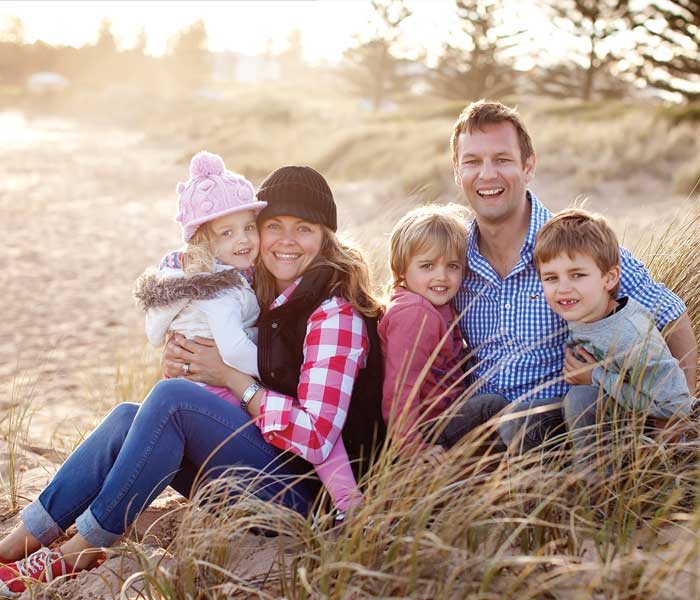
“Mat has a story of his own,” Taryn says of her husband. “He lived with me when I hated my body, when I didn’t want to go out and didn’t want to socialise.”
He also stood by her when she pushed herself through 15 intensive weeks of training to enter a bodybuilding competition; when she was, he says, “a total pain in the arse to live with… depleted, depraved and obsessed.”
“He doesn’t want our kids to grow up in a world that sexualises young girls and objectifies women, or a world with stereotypes for boys to be masculine and buff,” says Taryn.
“Working with each other every day is a new partnership we’re still getting our heads around. We are equally passionate and bullish, so we might have to have more date nights during the week!”
Taryn, who spent a year living in Christchurch as a hotel marketing manager before she was married, also has the support of her BIM ambassadors – 800 women around the world, including 20 New Zealanders, who are spreading the message of positive body image, and simply being positive role models.
Taryn is perfectly fine going out these days. She has to be – she spends a lot of time travelling the world. When I spoke to her, she was heading off on a three-week Embrace tour through North America, and hoping to show off her dance moves on The Ellen DeGeneres Show.
She is still a size 12, but now happy in her own skin, even if it is a little dimpled and lumpy. But does she still have the odd day of self-loathing, or just a little rage at uninvited cellulite?
“No. Never,” she says. “My relationship with my body is very different now. It’s not that I can’t acknowledge there are parts of my body that wobble or wiggle. But now it’s how I feel about what this body does, and the gratitude I feel for it.
“Before, I would have looked at these legs and gone, ‘Oh they have got a bit of cellulite, they’re a bit fat around the thighs, and have stretch marks everywhere.’ But now I look at them and think: ‘These legs have run a marathon! Even if it took me five-and-a-half hours, they are pretty amazing legs! And these arms that wobble, they can hug my kids.’
“I think it’s a real gift to have that perspective. You have to love the things you have; don’t wait till it’s too late. It is something that happens as you get older – you appreciate having a healthy or able body. If only we could tap into more of that in our 20s and 30s…”
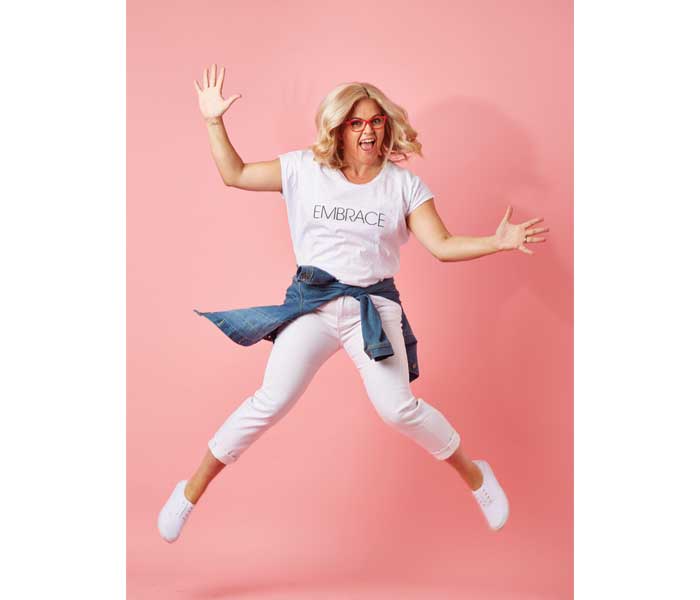
It was in her 30s that Taryn really struggled to get her head around the way she looked. By then she’d had three children – sons Oliver and Cruz, and daughter Mikaela – and hated her “broken body”. She was booked in with a plastic surgeon who promised her perkier breasts and a slimmer belly, until she looked at three-year-old Mikaela and asked herself: “If I go through this, what am I saying to my daughter?” Would she one day want to change her body too?
Even after cancelling the surgery, it took Taryn time to come to the realisation that maybe she could still love her body with all its imperfections.
“It was like winning the golden ticket – having the knowledge to love and embrace my body, when so many women are searching for the perfect bikini body to find happiness.”
When her friends began to lament their changing body shapes over a Sunday lunch, Taryn went home and posted her topsy-turvy before-and-after photos on Facebook.
The first image was taken at the end of her 15-week flirtation with bodybuilding the year before, which left her feeling empty and “imbalanced”; and the second was of a healthier, happier and curvier Taryn snapped six months after. She wrote the words: Be loyal to your body, love your body, it’s the only one you’ve got.
The instant response was mind-blowing – more than three million likes; over 7000 messages. It spurred other women to open up and share their own struggles with body acceptance and society’s ideal of beauty. Then there were other commenters who were not so kind. Taryn was called fat and ugly, a lazy pig, and accused of promoting obesity.
“I was feeling a bit torn at first whether I should fight back. But it became pretty clear there were too many comments to reply to,” she says. “It quickly turned into something that fuelled me in a positive way, made me want to do more, to start conversations, and change people’s minds.”
She believes she’s already succeeding. “Body shamers”, who once judged people on how they looked, have written to her explaining how after watching her documentary, Embrace, they’ve changed their tune.
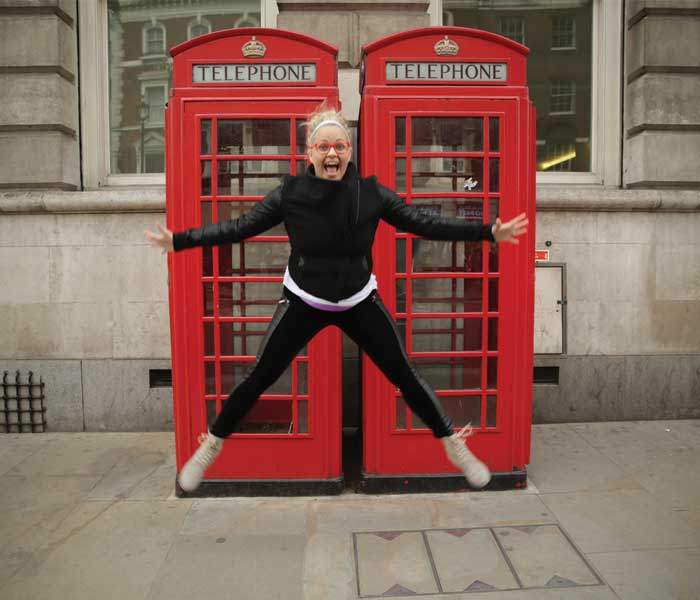
“They now understand that health isn’t just physical, it’s also mental and emotional,” Taryn says. “There’s already a little more understanding out there, rather than people being so offended by seeing someone who is larger, or a body that doesn’t conform to what we often see celebrated as beauty or health.”
Since its release in June last year, Embrace has reached an audience of well over 100,000 in New Zealand, Australia, the United States and now the United Kingdom. There were sold-out screenings in our major cities during the 2016 New Zealand International Film Festival.
The inspiration to make the 90-minute movie came to Taryn after she was invited to speak on television shows, and realised she could make more of an impact with longer screen-time. With the help of crowd-funding – which raised over $350,000 pledged by more than 9000 people – Taryn spent nine weeks travelling the world, meeting some of those who had messaged her and influential women who also felt the pressure of conforming to society’s unrealistic stereotypes.
It’s a powerful story, told through the anguish, frustration and, in some cases, acceptance of other women. Melbourne model Stefania Ferrario – who has fought to stop fashion houses labelling models “plus size” – saw young girls on the catwalk eating cotton balls to swell their stomachs. Talk show host and Hairspray actress Ricki Lake resented having spent so much of her life hating herself in the mirror, but now calls herself a shape-shifter: “I’m soft and I smell good.”
In the movie, Taryn appears in a New York photo shoot with women of various shapes and sizes, captured by noted photographer and documentary maker B. Jeffrey Madoff.
“If there was more affection and acceptance rather than criticism and vitriol and pointing, the world would be a better place,” Madoff says.
Taryn, who spent 10 years as a photographer of children and families, found making Embrace both rewarding and difficult, in her first encounter as a screenwriter, director and producer. But again, she didn’t tackle it alone; among the experienced moviemakers on set was acclaimed New Zealand executive producer Tim White (Mahana, Chasing Great, Pork Pie).
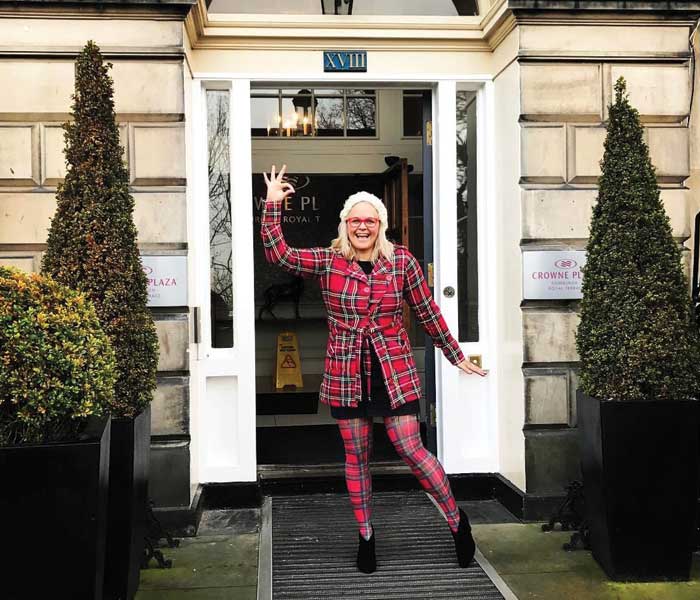
“The response to the film has been overwhelming. We get hundreds of messages every day from women around the world sharing their stories and revelations after watching it – some heartbreaking, some inspiring,” Taryn says. “It’s doing what I wanted it to do – starting really important conversations with lots of women around the world.”
There’s the classic example of an Australian mum who’d never been swimming with her four-year-old daughter, fearing being seen in a swimsuit in public.
“She could have stayed as that woman sitting on the sidelines, not engaging in life,” Taryn says, “but then she sent me a photo of her doing a bomb in the pool!”
The Body Image Movement, now requiring the Brumfitt’s full attention, is also making a big splash. Among its actions is an online petition calling for a law change in Australia, requiring images where models’ bodies have been digitally altered to be identified as such.
“France and Israel have passed those laws; why can’t we have them in New Zealand and Australia? On Instagram, we’re now seeing everyday people changing their own photos before they post them. What sort of weird, warped world do we live in, when we can’t just be who we are? We’ve become so disconnected about what life is like and what it should feel like, because we are so concerned about how our bodies look,” Taryn says.
While social media is recognised as one of the worst platforms for endorsing negative body ideals (best-selling author and girls’ leadership teacher Rachel Simmons calls it a “toxic mirror”), Taryn also sees it as a necessary evil.
“Ten years ago, it would have been very hard for me to tell this story without social media,” she says.
“Social media can be a very positive thing if people make the right choices and take the responsibility to make sure their news feeds are filled with really inspiring people. It’s something I talk to teenage girls about often. I look at their news feeds and say: ‘Is this inspiring you to be a better person; does this make you feel great today?’ Fill your feeds with positivity.”
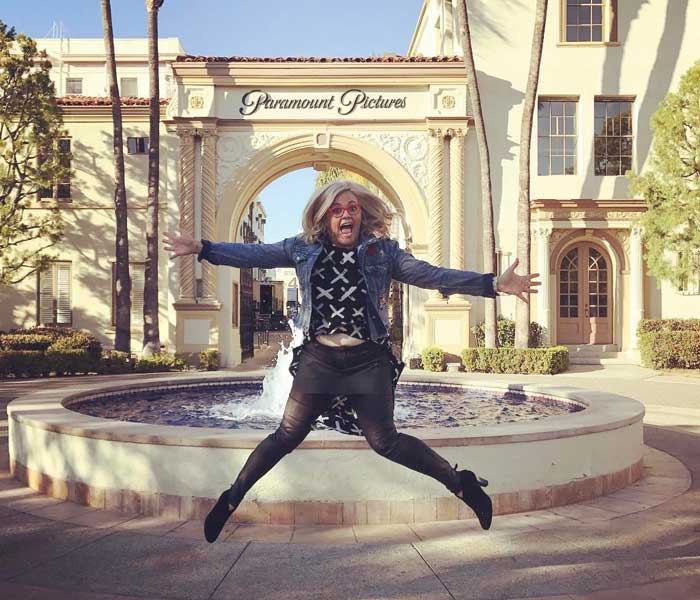
In measuring the success of her crusade, Taryn has a list of goals she hopes to achieve, none of them easy.
“Getting the message out to the 7.4 billion people who live in the world will be my life’s work. It’s a big job.”
She hopes Embrace and BIM may one day lead to a drop in the rates of eating disorders, suicide, depression and anxiety relating to body dissatisfaction. And a decrease in cosmetic surgeries. She also hopes it will have an impact on the opposite sex, and reduce the use of steroids by teenage boys.
“I want to see an increase in women’s leadership roles and gender equality. The women’s marches around the world in January gave me goose-bumps – to see women in the world moved, connected and united,” she says.
“Looking back in history, women’s roles in life have been based on how they look, how they present themselves. This generation of women has to let go of being ‘hot’ and ‘sexy’, and realise our bodies are not ornaments. They are vehicles. Let’s use our brilliant minds to come together and contribute to the world.”
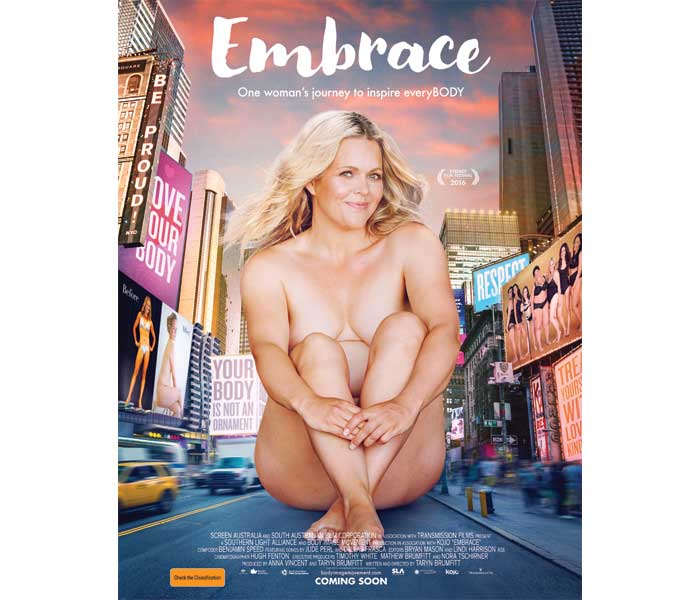
Taryn’s movie Embrace is available at some dvd stores and online.
Taryn and Mat’s children are still young. Oliver is 10, Cruz eight, and Mikaela – the little girl who, unknowingly, turned her mother’s life around – is now seven. Do they comprehend what a mover and shaker their mum has become and why she gets stopped in the supermarket?
“When people ask them, ‘What is it your mummy does?’, all three kids say, ‘Mum teaches people how to love their bodies.’ But they’re kids, right? All they want to know is what’s for dinner, and where are their soccer shoes. In terms of BIM or Embrace, they don’t really understand the enormity of it.
“But they’ve been great little helpers. We’ve travelled together when we’ve released the film, and they hand out flyers at the cinema. It’s great to share those moments with them.”
One day, though, Mikaela will watch all of Embrace and understand the message Taryn has for her: “There’s so much goodness in the world and I can’t wait to share with you everything I have learned. In your lifetime, there will be people who try to tell you that you need to change.
But you don’t. Your purpose in life is not to be an ornament to be looked at, but rather to do, feel, accomplish and contribute. Darling girl, don’t make my mistakes. Don’t waste a single day of your life being at war with your body. Just embrace it!”
How we see ourselves
– The average New Zealand female weighs 72.6kg and is 162.2cm tall. (2011 University of Otago and Ministry of Health survey.)
– The average dress size for a New Zealand woman is 12-14.
– 75 per cent of New Zealand teenage girls worry about gaining weight.
– 33 per cent of New Zealand teenage girls are teased by family members because of their weight.
– 32 per cent of New Zealand teenage girls are happy or very happy with their weight.
– 32 per cent of New Zealand teenage girls are unhappy or very unhappy with their weight. (The Health and Wellbeing of New Zealand Secondary School Students in 2012 survey.)
– One in three New Zealand women are happy with their weight.
– The number of New Zealand women dieting decreased from 32 per cent in 2012, to 23 per cent in 2015. (New Zealand Body Survey, NEXT magazine, 2015.)
Words: Suzanne McFadden
For more from The Australian Women’s Weekly, follow us on Facebook or Instagram.
